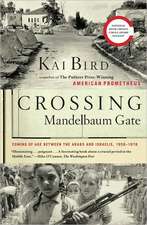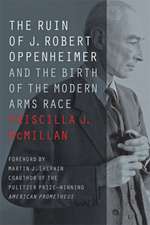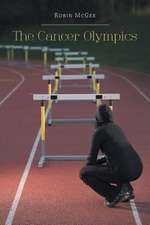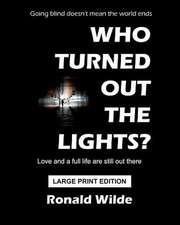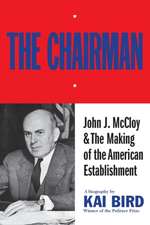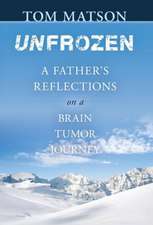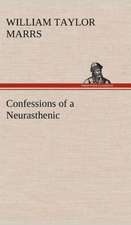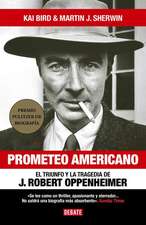American Prometheus: The Triumph and Tragedy of J. Robert Oppenheimer
Autor Kai Bird, Martin J. Sherwinen Limba Engleză Paperback – iun 2023
***SOON TO BE A MAJOR HOLLYWOOD FILM DIRECTED BY CHRISTOPHER NOLAN***
WINNER OF THE PULITZER PRIZE FOR NONFICTION
'Reads like a thriller, gripping and terrifying' Sunday Times
Physicist and polymath, as familiar with Hindu scriptures as he was with quantum mechanics, J. Robert Oppenheimer - director of the Manhattan Project that developed the atomic bomb - was the most famous scientist of his generation. In their meticulous and riveting biography, Kai Bird and Martin J. Sherwin reveal a brilliant, ambitious, complex and flawed man, profoundly involved with some of the momentous events of the twentieth century.
| Toate formatele și edițiile | Preț | Express |
|---|---|---|
| Paperback (2) | 75.93 lei 3-4 săpt. | +36.21 lei 5-11 zile |
| ATLANTIC BOOKS LTD – iun 2023 | 75.93 lei 3-4 săpt. | +36.21 lei 5-11 zile |
| Vintage Books USA – 31 mar 2006 | 130.96 lei 17-23 zile | +11.35 lei 5-11 zile |
| Hardback (1) | 312.11 lei 3-5 săpt. | |
| Knopf Doubleday Publishing Group – mai 2005 | 312.11 lei 3-5 săpt. |
Preț: 75.93 lei
Preț vechi: 86.40 lei
-12% Nou
14.53€ • 15.11$ • 11.100£
Carte disponibilă
Livrare economică 24-31 martie
Livrare express 08-14 martie pentru 46.20 lei
Specificații
ISBN-10: 183895970X
Pagini: 736
Ilustrații: 2 x 16pp b/w plates
Dimensiuni: 132 x 198 x 55 mm
Greutate: 0.63 kg
Ediția:Tie-In
Editura: ATLANTIC BOOKS LTD
Notă biografică
Kai Bird is a contributing editor at The Nation and the author of several biographies, including The Chairman, The Color of Truth, The Good Spy and The Outlier. He is the recipient of a Guggenheim Fellowship and a MacArthur Writing Fellowship.
Martin J. Sherwin was a Professor of History at George Mason University. His other books include A World Destroyed, winner of the Stuart L. Bernath and the American History Book prizes, and Gambling with Armageddon.
Extras
In the first decade of the twentieth century, science initiated a second American revolution. A nation on horseback was soon transformed by the internal combustion engine, manned flight and a multitude of other inventions. These technological innovations quickly changed the lives of ordinary men and women. But simultaneously an esoteric band of scientists was creating an even more fundamental revolution. Theoretical physicists across the globe were beginning to alter the way we understand space and time. Radioactivity was discovered on March 1, 1896, by the French physicist Henri Becquerel. Max Planck, Marie Curie and Pierre Curie and others provided further insights into the nature of the atom. And then, in 1905, Albert Einstein published his special theory of relativity. Suddenly, the universe appeared to have changed.
Around the globe, scientists were soon to be celebrated as a new kind of hero, promising to usher in a renaissance of rationality, prosperity and social meritocracy. In America, reform movements were challenging the old order. Theodore Roosevelt was using the bully pulpit of the White House to argue that good government in alliance with science and applied technology could forge an enlightened new Progressive Era.
Into this world of promise was born J. Robert Oppenheimer, on April 22, 1904. He came from a family of first- and second-generation German immigrants striving to be American. Ethnically and culturally Jewish, the Oppenheimers of New York belonged to no synagogue. Without rejecting their Jewishness they chose to shape their identity within a uniquely American offshoot of Judaism—the Ethical Culture Society—that celebrated rationalism and a progressive brand of secular humanism. This was at the same time an innovative approach to the quandaries any immigrant to America faced—and yet for Robert Oppenheimer it reinforced a lifelong ambivalence about his Jewish identity.
As its name suggests, Ethical Culture was not a religion but a way of life that promoted social justice over self-aggrandizement. It was no accident that the young boy who would become known as the father of the atomic era was reared in a culture that valued independent inquiry, empirical exploration and the free-thinking mind—in short, the values of science. And yet, it was the irony of Robert Oppenheimer’s odyssey that a life devoted to social justice, rationality and science would become a metaphor for mass death beneath a mushroom cloud.
Robert’s father, Julius Oppenheimer, was born on May 12, 1871, in the German town of Hanau, just east of Frankfurt. Julius’ father, Benjamin Pinhas Oppenheimer, was an untutored peasant and grain trader who had been raised in a hovel in “an almost medieval German village,” Robert later reported. Julius had two brothers and three sisters. In 1870, two of Benjamin’s cousins by marriage emigrated to New York. Within a few years these two young men—named Sigmund and Solomon Rothfeld—joined another relative, J. H. Stern, to start a small company to import men’s suit linings. The company did extremely well serving the city’s flourishing new trade in ready-made clothing. In the late 1880s, the Rothfelds sent word to Benjamin Oppenheimer that there was room in the business for his sons.
Julius arrived in New York in the spring of 1888, several years after his older brother Emil. A tall, thin-limbed, awkward young man, he was put to work in the company warehouse, sorting bolts of cloth. Although he brought no monetary assets to the firm and spoke not a word of English, he was determined to remake himself. He had an eye for color and in time acquired a reputation as one of the most knowledgeable “fabrics” men in the city. Emil and Julius rode out the recession of 1893, and by the turn of the century Julius was a full partner in the firm of Rothfeld, Stern & Company. He dressed to fit the part, always adorned in a white high-collared shirt, a conservative tie and a dark business suit. His manners were as immaculate as his dress. From all accounts, Julius was an extremely likeable young man. “You have a way with you that just invites confidence to the highest degree,” wrote his future wife in 1903, “and for the best and finest reasons.” By the time he turned thirty, he spoke remarkably good English, and, though completely self-taught, he had read widely in American and European history. A lover of art, he spent his free hours on weekends roaming New York’s numerous art galleries.
It may have been on one such occasion that he was introduced to a young painter, Ella Friedman, “an exquisitely beautiful” brunette with finely chiseled features, “expressive gray-blue eyes and long black lashes,” a slender figure—and a congenitally unformed left hand. To hide this deformity, Ella always wore long sleeves and a pair of chamois gloves. The glove covering her left hand contained a primitive prosthetic device with a spring attached to an artificial thumb. Julius fell in love with her. The Friedmans, of Bavarian Jewish extraction, had settled in Baltimore in the 1840s. Ella was born in 1869. A family friend once described her as “a gentle, exquisite, slim, tallish, blue-eyed woman, terribly sensitive, extremely polite; she was always thinking what would make people comfortable or happy.” In her twenties, she spent a year in Paris studying the early Impressionist painters. Upon her return she taught art at Barnard College. By the time she met Julius, she was an accomplished enough painter to have her own students and a private rooftop studio in a New York apartment building.
All this was unusual enough for a woman at the turn of the century, but Ella was a powerful personality in many respects. Her formal, elegant demeanor struck some people upon first acquaintance as haughty coolness. Her drive and discipline in the studio and at home seemed excessive in a woman so blessed with material comforts. Julius worshipped her, and she returned his love. Just days before their marriage, Ella wrote to her fiancé: “I do so want you to be able to enjoy life in its best and fullest sense, and you will help me take care of you? To take care of someone whom one really loves has an indescribable sweetness of which a whole lifetime cannot rob me. Good-night, dearest.”
On March 23, 1903, Julius and Ella were married and moved into a sharp-gabled stone house at 250 West 94th Street. A year later, in the midst of the coldest spring on record, Ella, thirty-four years old, gave birth to a son after a difficult pregnancy. Julius had already settled on naming his firstborn Robert; but at the last moment, according to family lore, he decided to add a first initial, “J,” in front of “Robert.” Actually, the boy’s birth certificate reads “Julius Robert Oppenheimer,” evidence that Julius had decided to name the boy after himself. This would be unremarkable—except that naming a baby after any living relative is contrary to European Jewish tradition. In any case, the boy would always be called Robert and, curiously, he in turn always insisted that his first initial stood for nothing at all. Apparently, Jewish traditions played no role in the Oppenheimer household.
Sometime after Robert’s arrival, Julius moved his family to a spacious eleventh-floor apartment at 155 Riverside Drive, overlooking the Hudson River at West 88th Street. The apartment, occupying an entire floor, was exquisitely decorated with fine European furniture. Over the years, the Oppenheimers also acquired a remarkable collection of French Postimpressionist and Fauvist paintings chosen by Ella. By the time Robert was a young man, the collection included a 1901 “blue period” painting by Pablo Picasso entitled Mother and Child, a Rembrandt etching, and paintings by Edouard Vuillard, André Derain and Pierre-Auguste Renoir. Three Vincent Van Gogh paintings—Enclosed Field with Rising Sun (Saint-Remy, 1889), First Steps (After Millet) (Saint-Remy, 1889) and Portrait of Adeline Ravoux (Auvers-sur-Oise, 1890)—dominated a living room wallpapered in gold gilt. Sometime later they acquired a drawing by Paul Cézanne and a painting by Maurice de Vlaminck. A head by the French sculptor Charles Despiau rounded out this exquisite collection.*
Ella ran the household to exacting standards. “Excellence and purpose” was a constant refrain in young Robert’s ears. Three live-in maids kept the apartment spotless. Robert had a Catholic Irish nursemaid named Nellie Connolly, and later, a French governess who taught him a little French. German, on the other hand, was not spoken at home. “My mother didn’t talk it well,” Robert recalled, “[and] my father didn’t believe in talking it.” Robert would learn German in school.
On weekends, the family would go for drives in the countryside in their Packard, driven by a gray-uniformed chauffeur. When Robert was eleven or twelve, Julius bought a substantial summer home at Bay Shore, Long Island, where Robert learned to sail. At the pier below the house, Julius moored a forty-foot sailing yacht, christened the Lorelei, a luxurious craft outfitted with all the amenities. “It was lovely on that bay,” Robert’s brother, Frank, would later recall fondly. “It was seven acres . . . a big vegetable garden and lots and lots of flowers.” As a family friend later observed, “Robert was doted on by his parents. . . . He had everything he wanted; you might say he was brought up in luxury.” But despite this, none of his childhood friends thought him spoiled. “He was extremely generous with money and material things,” recalled Harold Cherniss. “He was not a spoiled child in any sense.”
By 1914, when World War I broke out in Europe, Julius Oppenheimer was a very prosperous businessman. His net worth certainly totaled more than several hundred thousand dollars—which made him the equivalent of a multimillionaire in current dollars. By all accounts, the Oppenheimer marriage was a loving partnership. But Robert’s friends were always struck by their contrasting personalities. “He [Julius] was jolly German-Jewish,” recalled Francis Fergusson, one of Robert’s closest friends. “Extremely likeable. I was surprised that Robert’s mother had married him because he seemed such a hearty and laughing kind of person. But she was very fond of him and handled him beautifully. They were very fond of each other. It was an excellent marriage.”
Julius was a conversationalist and extrovert. He loved art and music and thought Beethoven’s Eroica symphony “one of the great masterpieces.” A family friend, the anthropologist George Boas, later recalled that Julius “had all the sensitiveness of both his sons.” Boas thought him “one of the kindest men I ever knew.” But sometimes, to the embarrassment of his sons, Julius would burst out singing at the dinner table. He enjoyed a good argument. Ella, by contrast, sat quietly and never joined in the banter. “She [Ella] was a very delicate person,” another friend of Robert’s, the distinguished writer Paul Horgan, observed, “. . . highly attenuated emotionally, and she always presided with a great delicacy and grace at the table and other events, but [she was] a mournful person.”
Four years after Robert’s birth, Ella bore another son, Lewis Frank Oppenheimer, but the infant soon died, a victim of stenosis of the pylorus, a congenital obstruction of the opening from the stomach to the small intestine. In her grief, Ella thereafter always seemed physically more fragile. Because young Robert himself was frequently ill as a child, Ella became overly protective. Fearing germs, she kept Robert apart from other children. He was never allowed to buy food from street vendors, and instead of taking him to get a haircut in a barber shop Ella had a barber come to the apartment.
Introspective by nature and never athletic, Robert spent his early childhood in the comfortable loneliness of his mother’s nest on Riverside Drive. The relationship between mother and son was always intense. Ella encouraged Robert to paint—he did landscapes—but he gave it up when he went to college. Robert worshipped his mother. But Ella could be quietly demanding. “This was a woman,” recalled a family friend, “who would never allow anything unpleasant to be mentioned at the table.”
Robert quickly sensed that his mother disapproved of the people in her husband’s world of trade and commerce. Most of Julius’s business colleagues, of course, were first-generation Jews, and Ella made it clear to her son that she felt ill-at-ease with their “obtrusive manners.” More than most boys, Robert grew up feeling torn between his mother’s strict standards and his father’s gregarious behavior. At times, he felt ashamed of his father’s spontaneity—and at the same time he would feel guilty that he felt ashamed. “Julius’s articulate and sometimes noisy pride in Robert annoyed him greatly,” recalled a childhood friend. As an adult, Robert gave his friend and former teacher Herbert Smith a handsome engraving of the scene in Shakespeare’s Coriolanus where the hero is unclasping his mother’s hand and throwing her to the ground. Smith was sure that Robert was sending him a message, acknowledging how difficult it had been for him to separate from his own mother.
When he was only five or six, Ella insisted that he take piano lessons. Robert dutifully practiced every day, hating it all the while. About a year later, he fell sick and his mother characteristically suspected the worst, perhaps a case of infantile paralysis. Nursing him back to health, she kept asking him how he felt until one day he looked up from his sickbed and grumbled, “Just as I do when I have to take piano lessons.” Ella relented, and the lessons ended.
In 1909, when Robert was only five, Julius took him on the first of four transatlantic crossings to visit his grandfather Benjamin in Germany. They made the trip again two years later; by then Grandfather Benjamin was
seventy-five years old, but he left an indelible impression on his grandson. “It was clear,” Robert recalled, “that one of the great joys in life for him was reading, but he had probably hardly been to school.” One day, while watching Robert play with some wooden blocks, Benjamin decided to give him an encyclopedia of architecture. He also gave him a “perfectly conventional” rock collection consisting of a box with perhaps two dozen rock samples labeled in German. “From then on,” Robert later recounted, “I became, in a completely childish way, an ardent mineral collector.” Back home in New York, he persuaded his father to take him on rock-hunting expeditions along the Palisades. Soon the apartment on Riverside Drive was crammed with Robert’s rocks, each neatly labeled with its scientific name. Julius encouraged his son in this solitary hobby, plying him with books on the subject. Long afterward, Robert recounted that he had no interest in the geological origins of his rocks, but was fascinated by the structure of crystals and polarized light.
From the ages of seven through twelve, Robert had three solitary but all-consuming passions: minerals, writing and reading poetry, and building with blocks. Later he would recall that he occupied his time with these activities “not because they were something I had companionship in or because they had any relation to school—but just for the hell of it.” By the age of twelve, he was using the family typewriter to correspond with a number of well-known local geologists about the rock formations he had studied in Central Park.
From the Hardcover edition.
Recenzii
--Eric Foner
"This fascinating and thoughtful book brilliantly captures the political and scientific struggles of the early atomic age. Oppenheimer's triumphs and trials show how public policy, scientific genius and private character become interwoven. Bird and Sherwin have triumphed in turning their prodigious research about the father of the bomb into a poignant narrative."
--Walter Isaacson
"This superb biography provides fresh revelations and penetrating insights about the complex and fascinating personality of Robert Oppenheimer." American Prometheus," is meticulously researched, eloquently written and a joy to read. The account of his 1954 trial is spellbinding."
--Robert S. Norris, author of "Racing for the Bomb, General Leslie R. Groves the Manhattan Project's Indispensable Man"
"American Prometheus is the best--most thoroughly researched and most convincingly argued--study of J. Robert Oppenheimer to date. It is not only a great biography but also a cautionary tale about the excesses of government in a time of fear. No one interested in 20th-century America can afford to ignore this book."
--Robert Dallek "The political drama is enhanced by the close attention to Oppenheimer's personal life, ...restoring human complexity to a man who had been both elevated and demonized."
-"Publishers Weekly," starred review
"Compelling, definitive...Funneling more than 25 years of research into a captivating narrative, the authors bring needed perspective to Oppenheimer's radical activities in the 1930s, and they reprise the familiar story of the Manhattan Project thoroughly...Where Bird and Sherwin are without peer, however, is in capturing the humanity of the man behind the porkpie hat."
-"Booklist," starred review
"A swiftly moving narrative full of morality tales and juicy gossip. One of the best scientific biographies to appear in recent years."
-"Kirkus," starred review
"A masterful account--a tour de force, 25 years in the making--of Oppenheimer's rise and fall, set in the context of the turbulent decades of American's own transformation."
--Gerald Holton, Front page, Los Angeles Times
"Comprehensive, finely judged where it most matters, and sometimes revelatory . . . Bird and Sherwin capture all the drama and exhilaration and ironic glory (of Los Alamos) . . . and show how well he anticipated our own world, where nuclear materials and technologies percolate through shadowy networks."
--James Gleick, Front page, Washington Post Book World
"A nuanced and exacting portrait."
--Elizabeth Svoboda, Front page San Francisco Chronicle
"The definitive biography...Oppenheimer's life does not influence us. It haunts us."
-Malcom Jones, "Newsweek
""A work of voluminous scholarship and lucid insight, unifying its multifaceted portrait with a keen grasp of Oppenheimer's essential nature...charm and bravado on the surface, Dostoyevskian darkness underneath."
-Janet Maslin, "The New York Times
""In this stunning blockbuster, two accomplished Cold War historians have come together to tell Robert Oppenheimer's poignant and extraordinary story."
-Lawrence D.Freedman, "Foreign Affairs"
"Superb...A vivid portrait is painted of a charismatic, immensely human theoretical physicist, who was as talented as he was complex."
-Ike Seamans, "The Miami Herald"
"A masterpiece of scholarship and riveting writing that brings vividly to life the complicated and often enigmatic Oppenheimer."
--Eric Arnesen, "The Chicago Tribune"
Descriere
"American Prometheus" is the first full-scale biography of J. Robert Oppenheimer, "father of the atomic bomb," the brilliant, charismatic physicist who led the effort to capture the awesome fire of the sun for his country in time of war. Immediately after Hiroshima, he became the most famous scientist of his generation-one of the iconic figures of the twentieth century, the embodiment of modern man confronting the consequences of scientific progress.
He was the author of a radical proposal to place international controls over atomic materials-an idea that is still relevant today. He opposed the development of the hydrogen bomb and criticized the Air Force's plans to fight an infinitely dangerous nuclear war. In the now almost-forgotten hysteria of the early 1950s, his ideas were anathema to powerful advocates of a massive nuclear buildup, and, in response, Atomic Energy Commission chairman Lewis Strauss, Superbomb advocate Edward Teller and FBI director J. Edgar Hoover worked behind the scenes to have a hearing board find that Oppenheimer could not be trusted with America's nuclear secrets.
"American Prometheus" sets forth Oppenheimer's life and times in revealing and unprecedented detail. Exhaustively researched, it is based on thousands of records and letters gathered from archives in America and abroad, on massive FBI files and on close to a hundred interviews with Oppenheimer's friends, relatives and colleagues.
We follow him from his earliest education at the turn of the twentieth century at New York City's Ethical Culture School, through personal crises at Harvard and Cambridge universities. Then to Germany, where he studied quantum physics with the world's most accomplished theorists; and to Berkeley, California, where he established, during the 1930s, the leading American school of theoretical physics, and where he became deeply involved with social justice causes and their advocates, many of whom were communists. Then to Los Alamos, New Mexico, where he transformed a bleak mesa into the world's most potent nuclear weapons laboratory-and where he himself was transformed. And finally, to the Institute for Advanced Study in Princeton, which he directed from 1947 to 1966.
"American Prometheus "is a rich evocation of America at midcentury, a new and compelling portrait of a brilliant, ambitious, complex and flawed man profoundly connected to its major events-the Depression, World War II and the Cold War. It is at once biography and history, and essential to our understanding of our recent past-and of our choices for the future.








